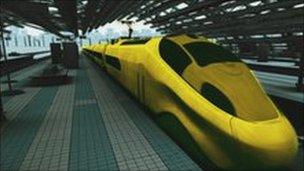HS2 high speed rail link flawed, says think tank
- Published

The IEA said the HS2 rail link was a "political vanity project" and a "recipe for disaster"
The government's planned HS2 high-speed rail project connecting London and Birmingham is "economically flawed", a leading think tank has said.
A report by the Institute of Economic Affairs said HS2 will require a £1,000 contribution per income taxpayer and is not commercially viable.
HS2 - set to cost £32bn, of which £17bn will link London and Birmingham - is expected to be built by around 2026.
The Department for Transport said HS2 would help to "drive economic growth".
Last month Prime Minister David Cameron told an audience in Birmingham the government is "committed to HS2".
The HS2 route is set to run through rural parts of Buckinghamshire, Oxfordshire, Northamptonshire, Warwickshire and Staffordshire.
In addition to the connection between London and Birmingham, there are also plans for a Y-shaped extension to Manchester and Leeds, and possibly further north, to be completed around 2032/33.
The entire cost of the project is expected to be £32bn.
The IEA, which is described as a free-market think tank, said HS2 was a "political vanity project" and based on "bogus assumptions".
It said estimates made by the government for demand on the route were very optimistic.
The report said the first five miles of HS2, from London Euston station to Old Oak Common in west London, will add almost 25% - around £4bn - to the cost of the first phase but would deliver negligible time savings.
The think tank also said significant environmental and social costs were not included in the assessment of the economic case, with several areas likely to be affected by planning blight.
And the environmental credentials of the rail link were said to be highly questionable.
The report's authors said that, at 225mph, the trains will be the fastest in Europe and will consume disproportionate levels of power via the National Grid.
'Recipe for disaster'
IEA deputy editorial director Dr Richard Wellings, one of the report's authors, said: "HS2 is another political vanity project - like Concorde and the Millennium Dome - being ploughed ahead with complete disregard for properly thought through commercial prospects or the mounting opposition to it.
"Its environmental credentials are questionable, its projected passenger figures suspect, and its proposed regenerative effects highly dubious."
He said the decision to go ahead with the planned rail link was "a recipe for disaster" and, adding that it would be "the forever-embattled British taxpayer who will end up footing the bill for this latest white elephant".
The Campaign for High-Speed Rail said it was "hugely disappointed" and "shocked" by the views expressed in the report.
Professor David Begg, director of the campaign group, said the think tank had "completely failed to grasp the wider benefits of the high-speed rail project, which will create jobs, boost investment and spread the economic wealth of this country".
'Economic benefits'
He said the claim that the project would cost each taxpayer £1,000 was based on a "regurgitation of weak research carried out by the Taxpayers' Alliance in February, which has not stood up to public or industry scrutiny since".
"This is grossly disingenuous, as it fails to account for fare revenues, private investment and generated taxation that will offset the public investment," he said.
Meanwhile, the Department for Transport (DfT) said the high-speed rail network plans would "deliver £44bn in economic benefits for the country and support broader job creation, regeneration and economic growth".
A DfT spokesman said: "The alternative, according to the IEA, would be for the government to stop investing in the railways, close many of the railway lines that currently exist and sit on its hands as ticket prices get higher, performance deteriorates and crowding increases.
"This government believes in supporting the railways as a way of driving economic growth, improving connectivity and providing a cleaner and greener alternative to short-haul aviation and more journeys by car. In short, high speed rail is not something this country can afford to ignore."
- Published28 June 2011
- Published21 June 2011
- Published15 June 2011